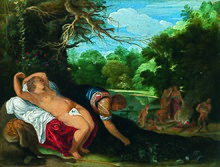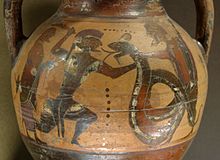Coronis (lover of Apollo)
| Coronis | |
|---|---|
 Apollo and Coronis by Johann König | |
| Abode | Thessaly |
| Personal information | |
| Parents | Phlegyas and Cleophema |
| Consort | Apollo, Ischys |
| Children | Asclepius |
| Greek mythology |
|---|
 |
| Deities |
| Heroes and heroism |
| Related |
|
|
|
In Greek mythology, Coronis is a Thessalian princess and a lover of Apollo. She is the daughter of Phlegyas, king of the Lapiths, and . By Apollo she became the mother of Asclepius, the Greek god of medicine. While she was still pregnant, she cheated on Apollo with a mortal man named Ischys and was subsequently punished by the god for her betrayal. After failing to heal her, Apollo rescued their unborn child by performing caesarean. She was turned into a constellation after her death.
Mythology[]
Genealogy[]
Zeus gave the hand of the Muse Erato to . The pair had a daughter Cleophema, who married Phlegyas, the king of Lapiths. Their daughter was called Aegle, otherwise known as Coronis.[1] In some other accounts, her father was Azan, king of Arcadia.[2]
Lover of Apollo[]
One day Apollo saw Coronis and became enamoured of her. He lay with her in her home, and consequently she became pregnant. One time when Apollo was away performing his godly duties, Coronis fell in love with Ischys, son of Elatus. Going against her father's warnings, she slept with him in secret. Apollo, however, came to know of this affair through his prophetic powers. Angered, he sent his Artemis to kill Coronis. Accordingly, Artemis killed Coronis and her family with her arrows.[3] In one variation, Artemis kills them on her own accord to avenge the insult done to her brother.[4] Likewise, Ischys was killed by Zeus.[5]
In Ovid's poem, it is a crow that informed Apollo of the affair, and he killed Coronis with his own arrow. Before her death, Coronis accepted that her punishment was just. Apollo instantly regretted his impulsive action and tried to heal her, but Coronis was already dead. He then placed her body on the pyre and poured myrrh and other sweet fragrances on it as a part of the funerary rites.[6]

Not wanting his unborn child to suffer as well, Apollo cut Coronis's belly open when she was laid on her funeral pyre, and rescued the child by pulling it out. He named the child Asclepius and reared him for some time, teaching him about medicinal herbs.[7][8] Later, Apollo entrusted his son to Chiron, the wise centaur, who trained him more in medicine and hunting.[9][3]
According to a different version, Coronis gave birth to her son in Apollo's temple in the presence of the Moirai. Lachesis acted as the midwife and Apollo himself aided Coronis by easing her pains. Apollo named their son Asclepius after his mother's alias, Aegle.[1]
In yet another version, Coronis who was already impregnated by Apollo, had to accompany her father to Peloponnesos. She had kept her pregnancy hidden from her father. In Epidaurus, she bore a son and exposed him on a mountain. The child was given milk by one of the goats that pastured about the mountain, and was guarded by the watch-dog of the herd. Aresthanas, the owner of goats and the guard dogs, found the child. As he came near, he saw lightning that flashed from the child, and thinking of it to be a sign of divine, he left the child alone. Asclepius was later taken by Apollo.[10]
The raven and Constellation Corvus[]
According to Ovid, when Coronis was pregnant, Apollo had appointed a white raven to guard her before leaving. The raven, after learning the affair of Coronis with Ischys, reported it to Apollo. Apollo sent Artemis to kill the couple and in anger, turned the raven black by scorching it as a punishment for being a tattletale and failing its duty. This is why the ravens are black today.[6]
Istrus (Greek historian) and several others have said that Coronis was turned into the constellation Corvus.[7]
Notes[]
- ^ Jump up to: a b Isyllus, Hymn to Asclepius 128.37 ff.
- ^ Homeric Hymn to Apollo 3.209
- ^ Jump up to: a b Pindar, Pythian Odes 3.5
- ^ Pausanias, Description of Greece 2.26.6
- ^ Hyginus, Fabulae 202
- ^ Jump up to: a b Ovid, Metamorphoses 2.536 and 2.596
- ^ Jump up to: a b Hyginus, De Astronomica 2.40
- ^ Diodorus Siculus, Library of History 5.64.6
- ^ Pseudo-Apollodorus, Bibliotheca 3.10.3
- ^ Pausanias, Description of Greece 2.26.1-7
References[]
- Evelyn-White, Hugh, The Homeric Hymns and Homerica with an English Translation by Hugh G. Evelyn-White. Homeric Hymns. Cambridge, Massachusetts, Harvard University Press; London, William Heinemann Ltd. 1914.
- Pindar, Odes, Diane Arnson Svarlien. 1990. Online version at the Perseus Digital Library.
- Diodorus Siculus, Bibliotheca Historica. Vol 1-2. Immanel Bekker. Ludwig Dindorf. Friedrich Vogel. in aedibus B. G. Teubneri. Leipzig. 1888-1890. Greek text available at the Perseus Digital Library.
- Apollodorus, Apollodorus, The Library, with an English Translation by Sir James George Frazer, F.B.A., F.R.S. in 2 Volumes. Cambridge, MA, Harvard University Press; London, William Heinemann Ltd. 1921. Online version at the Perseus Digital Library.
- Pausanias, Pausanias Description of Greece with an English Translation by W.H.S. Jones, Litt.D., and H.A. Ormerod, M.A., in 4 Volumes. Cambridge, MA, Harvard University Press; London, William Heinemann Ltd. 1918. Online version at the Perseus Digital Library.
- Ovid. Metamorphoses, Volume I: Books 1-8. Translated by Frank Justus Miller. Revised by G. P. Goold. Loeb Classical Library No. 42. Cambridge, Massachusetts: Harvard University Press, 1977, first published 1916. ISBN 978-0-674-99046-3. Online version at Harvard University Press.
- Hyginus, Gaius Julius, The Myths of Hyginus. Edited and translated by Mary A. Grant, Lawrence: University of Kansas Press, 1960.
- Gaius Julius Hyginus, Astronomica from The Myths of Hyginus translated and edited by Mary Grant. University of Kansas Publications in Humanistic Studies. Online version at the Topos Text Project.
External links[]
 Media related to Coronis at Wikimedia Commons
Media related to Coronis at Wikimedia Commons
- Metamorphoses characters
- Princesses in Greek mythology
- Women of Apollo
- Women in Greek mythology
- Characters in Greek mythology